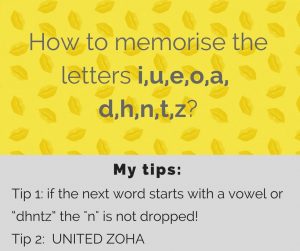Are you, like many of my students, also struggling with the pervasive Luxembourgish rule of final n-deletion in certain contexts? You do not know when to say ech hunn or ech hu, or is it den Tom or de Tom?
What is this rule all about?
The n- Regel also known as the “Eifeler Regel” in the Luxembourgish language is mainly a pronuciation based rule but the final ‘n’ or ‘nn’ of a word is also dropped in written language if it is not pronounced. Whether the final ‘n’ or ‘nn’ is dropped in Luxembourgish language, depends on the word, number or character that follows the word.
I have summarized the n-rule in easy steps:
The final ‘n’ or ‘nn’ of a word is not dropped:
a) if the next word starts with the consonants d, h, n, t, z.
Example : mäin Dësch, den Hond, den Noper, en Toast, den Zuch
b) if the next word starts with a vowel i, u, e, o, a:
Example : den Owend, mäin Auto, den Iesel, en Ee, den Ufank

c) if the next word starts with a ‘y’ followed by a consonant:
Example: den Yves (mee: de Yan!)
d) if the word is used alone or is located at the end of a line and sentence:
Example: Net fëmmen! Moien. Neen.
e) in front of any punctuation or special character:
Example: Du solls direkt ophalen! Ech kommen, wann ech Zäit hunn.
f) for defined exceptions: de Mann, d’Sonn, dënn, Maschinn,
g) for words ending with ioun: d’Situatioun, d’Reunioun
h) for words ending with in: eng Studentin, eng Affekotin, eng Italienerin
i) if the final ‘n’ is part of a name: brand, name, countries, cities etc
Example: den Här Schanen kënnt …., Spuenien läit ….., d’Karin wunnt zu ……, München läit an ….
The Eifeler Regel is also applied
j) when creating compound words:
Example: zesummen + setzen = zesummesetzen, Dammen + Schong = Dammeschong,k)
k) for verbs with seprarable particle : u(n)fänken: ech fänken haut um 8 Auer un.
l) Numbers: véieravéierzeg (44), sechsasiechzeg (66) …..
Take my advise here:
If you are a beginner do not focus on this rule and put your n at any word. That’ s better than dropping them when not necessary.
And if this was helpful please do share with friends or luxembourgsih language learner!
Anne
Filed under: Learning Tips




